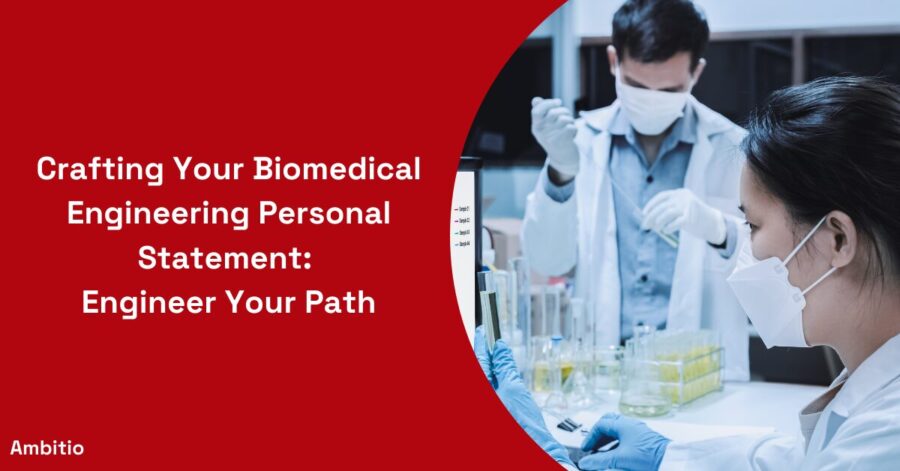12 December 2024
5 minutes read
Crafting Your Biomedical Engineering Personal Statement: Engineer Your Path

Introduction
Aspiring to become a biomedical engineer is a noble pursuit that entails a unique blend of science, engineering principles, and a passion for improving the quality of life.
Your journey toward this career path begins with crafting an exceptional personal statement. In this comprehensive guide, we will delve deep into the intricacies of creating an impactful biomedical engineering personal statement that can set you apart from the competition.
Unveiling the Biomedical Engineering Personal Statement
Your personal statement is not just a part of your university application; it’s a narrative of your journey, aspirations, and the potential impact you can have as a biomedical engineer. In this section, we’ll explore the essential components that should be present in your personal statement to make it truly shine.
Defining Your Passion
To kickstart your personal statement, you should vividly express your passion for biomedical engineering. Take the reader on a journey back to the moment you realized this was your calling. Whether it was a childhood fascination with the human body or an awe-inspiring experience in a medical environment, your passion should shine through.
Consider the following example:
“My journey into the world of biomedical engineering began at a young age when I was fascinated by the intricate workings of the human body. I vividly remember the day I first dissected a frog in biology class; the intricate network of veins and muscles ignited a spark within me. From that moment on, I knew I wanted to be part of a field that harnessed science and engineering to enhance the human experience.”
Academic Journey
Your academic journey plays a pivotal role in your personal statement. Admissions committees want to see evidence of your ability to excel in relevant subjects. Share your aptitude in mathematics, physics, and biology, and explain how these subjects have prepared you for a degree in biomedical engineering.
Here’s an example of how to incorporate your academic journey:
“During my A-levels, I immersed myself in subjects like mathematics, physics, and biology. These subjects not only challenged me but also fueled my passion for biomedical engineering.
I aced advanced mathematics courses, which honed my problem-solving skills and instilled a deep appreciation for the role of physics in medical technology. These academic experiences solidified my decision to study biomedical engineering.”
Work Experience and Volunteering
Work experience and volunteering opportunities in healthcare or engineering can set your personal statement apart. Describe any relevant experiences and explain how they allowed you to gain valuable skills and insights. Highlight the tangible impact of your work and how it aligns with your passion for biomedical engineering.
Use this example to demonstrate the significance of work experience:
“During my gap year, I had the privilege of working at a local medical equipment manufacturer. This opportunity exposed me to the practical aspects of biomedical engineering.
I was part of a team that designed and tested medical devices, and I could see firsthand how our work directly improved the lives of patients. This experience not only honed my engineering skills but also deepened my commitment to the field.”
Problem-solving and Engineering Techniques
One of the key traits of a successful biomedical engineer is the ability to solve complex problems and apply engineering techniques effectively. In your personal statement, showcase your problem-solving abilities and your proficiency in applying engineering techniques. Illustrate how these skills are crucial in the context of biomedical engineering.
Here’s an example that highlights your problem-solving skills:
“My academic journey and work experiences have honed my problem-solving skills. In my A-level coursework, I encountered challenging problems that required innovative solutions.
For example, during a class project, I faced the task of optimizing the design of a medical imaging device to minimize radiation exposure. This experience taught me the importance of precision, creativity, and ethical considerations in biomedical engineering.”
Impact on Healthcare
Biomedical engineers have the unique privilege of contributing to the improvement of healthcare and the overall quality of life. In your personal statement, express your desire to make a meaningful impact through the creation of new medical devices and technology. Emphasize how biomedical engineering plays a pivotal role in the diagnosis and treatment of medical conditions.
Utilize this example to convey your commitment to making a difference:
“My ultimate goal as a biomedical engineer is to make a positive impact on healthcare. I envision a future where innovative medical devices and technology transform the way we diagnose and treat diseases.
Whether it’s developing cutting-edge imaging techniques or designing efficient medical equipment, I am committed to being at the forefront of these advancements to improve the lives of countless individuals.”
Extracurricular Activities
Extracurricular activities are an essential aspect of your personal statement. They provide insight into your leadership, communication, and teamwork skills. Highlight any relevant activities that have honed your skills and experiences, making you an ideal candidate for a biomedical engineering degree.
Consider this example to showcase your extracurricular involvement:
“Outside of the classroom, I actively participated in robotics competitions and biomechanics clubs. These experiences not only deepened my understanding of engineering principles but also allowed me to work collaboratively with diverse teams. I developed leadership skills, learned to communicate effectively, and enjoyed applying classroom knowledge to real-world challenges.”
UCAS Recommendations and Uni Comparisons
When applying for a degree in biomedical engineering, it’s crucial to consider UCAS recommendations and compare undergraduate universities. Each institution may offer unique programs and opportunities, so make an informed choice that aligns with your career path.
UCAS Recommendations
UCAS, the Universities and Colleges Admissions Service, provides guidelines for your personal statement. Pay close attention to their recommendations regarding the length and content of your statement. While UCAS doesn’t dictate specific content, they emphasize the importance of personal experiences, passion, and suitability for the chosen course.
Ensure you adhere to their guidelines to create a statement that stands out and aligns with the expectations of admissions committees.
University Comparisons
Choosing the right university for your biomedical engineering journey is a critical decision. Take the time to research and compare undergraduate programs. Consider factors like course curriculum, faculty expertise, research opportunities, and campus facilities.
Additionally, look for universities that offer the specific areas of biomedical engineering that interest you, whether it’s medical imaging, biomaterials, biomechanics, or another specialization. Make an informed choice that aligns with your career goals.
Conclusion
Crafting a biomedical engineering personal statement is a journey in itself, one that reflects your passion, skills, and aspirations as an aspiring engineer.
By following the guidelines and examples provided in this comprehensive guide, you can create a personal statement that not only secures your spot in a reputable university but also propels you toward a fulfilling career in biomedical engineering.
Remember, your personal statement is your opportunity to engineer your path toward a brighter and more impactful future.
FAQs – Your Biomedical Engineering Personal Statement Queries Answered
Q1: What should I avoid in my biomedical engineering personal statement?
Avoid clichés, vague statements, and excessive technical jargon. Instead, focus on personal experiences, your passion, and the impact you wish to make as a biomedical engineer. Be genuine and authentic in your writing.
Q2: How long should my personal statement be?
UCAS recommends a maximum of 4,000 characters or 47 lines for your personal statement. Be concise while covering all relevant aspects of your journey and aspirations.
Q3: Can I mention work experience outside of engineering?
Yes, you can mention work experience outside of engineering if it relates to your skills or passion. Transferable skills acquired in diverse settings can be valuable in biomedical engineering.
Q4: Is it necessary to mention specific universities in my personal statement?
While not mandatory, mentioning specific universities can demonstrate your dedication to the program if done thoughtfully. Avoid generic statements and ensure your choice aligns with your career goals.
Q5: Can I edit my personal statement after submitting it through UCAS?
No, once you’ve submitted your personal statement through UCAS, you cannot make changes. Therefore, it’s crucial to review and refine your statement thoroughly before sending it off.

You can study at top universities worldwide!
Get expert tips and tricks to get into top universities with a free expert session.
Book Your Free 30-Minute Session Now! Book a call now




























